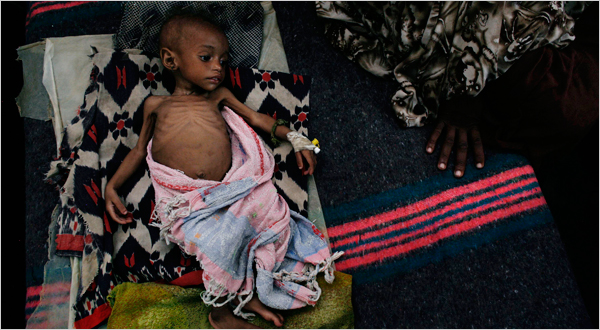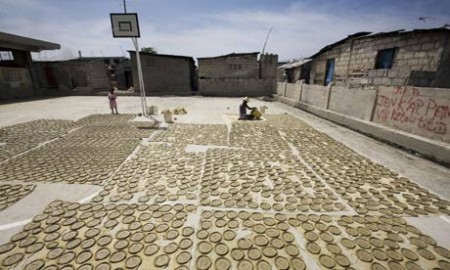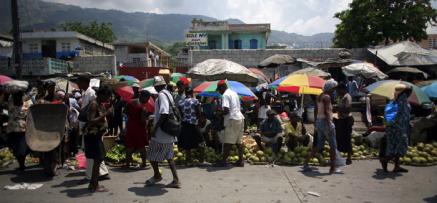We always knew that this would start happening. Earlier this month, I wrote about the severe economic problems that are plaguing South America, but up to this point I have neglected to discuss the horrific famines that are breaking out all over Africa. Right now there is a desperate need for food in South Sudan, Somalia, northeast Nigeria, Eritrea and Kenya. And Yemen, even though it is not technically part of Africa, is being affected by many of the same factors that are crippling nations all over eastern Africa. The United Nations says that more than 20 million people could die from starvation and disease if nothing is done. When I write about economic collapse, this is the kind of thing that I am talking about, and we are starting to see alarming conditions spread across the globe. Many believe that we could never possibly face this kind of food crisis in the western world, but unfortunately wishful thinking will only get you so far.
starvation
With Spotlight on Pirates, Somalis on Land Waste Away in the Shadows

Above, a severely malnourished baby lay unresponsive on Thursday as the mother and father sat nearby in a feeding center in Afgooye, Somalia.
AFGOOYE, Somalia – Just step into a feeding center here, and the sense of hopelessness is overwhelming.
Dozens of women sit with listless babies in their laps, snapping their fingers, trying to get a flicker of life out of their dying children.
Little eyes close. Wizened 1-year-olds struggle to breathe. This is the place where help is supposed to be on its way. But the nurses in the filthy smocks are besieged. From the doorway, you can see the future of Somalia fading away.
While the audacity of a band of Somali pirates who hijacked a ship full of weapons has grabbed the world’s attention, it is the slow-burn suffering of millions of Somalis that seems to go almost unnoticed.
The suffering is not new. Or especially surprising. This country on the edge of Africa has been slowly, but inexorably, sliding toward an abyss for the past year and a half – or, some would argue, for the past 17. United Nations officials have called Somalia “the forgotten crisis.”
Read moreWith Spotlight on Pirates, Somalis on Land Waste Away in the Shadows
Haiti: Mud cakes become staple diet as cost of food soars beyond a family’s reach
With little cash and import prices rocketing half the population faces starvation

In Cité Soleil, one of Port-au-Prince’s worst slums, making the clay-based food is a major income earner. Mud cakes are the only inflation-proof food available to Haiti’s poor. Photograph: David Levene
At first sight the business resembles a thriving pottery. In a dusty courtyard women mould clay and water into hundreds of little platters and lay them out to harden under the Caribbean sun.
The craftsmanship is rough and the finished products are uneven. But customers do not object. This is Cité Soleil, Haiti’s most notorious slum, and these platters are not to hold food. They are food.
Read moreHaiti: Mud cakes become staple diet as cost of food soars beyond a family’s reach
At stake is no less than control of the world’s food supply.
Related articles:
Exposed: the great GM crops myth:
“Genetic modification actually cuts the productivity of crops, an authoritative new study shows, undermining repeated claims that a switch to the controversial technology is needed to solve the growing world food crisis.”
BIODIVERSITY: Privatisation Making Seeds Themselves Infertile
U.S. using food crisis to boost bio-engineered crops
____________________________________________________________________________________________
Heather Meek leafs through the seed catalogue she wrote on the family computer, on winter nights after the kids went to bed.
There are Kahnawake Mohawk beans and Painted Mountain corn; Tante Alice cucumber and 40 varieties of heritage tomatoes.
Selling seeds is more than just an extra source of income on this organic farm an hour northwest of Montreal.
For Meek and partner Frederic Sauriol, propagating local varieties is part of a David and Goliath struggle by small farmers against big seed companies.
At stake, they believe, is no less than control of the world’s food supply.
Since the dawn of civilization, farmers have saved seeds from the harvest and replanted them the following year.
But makers of genetically modified (GM) seeds — introduced in 1996 and now grown by some 70,000 Canadian farmers, according to Monsanto, the world’s largest seed company — have been putting a stop to that practice.
The 12 million farmers worldwide who will plant GM seeds this year sign contracts agreeing not to save or replant seeds. That means they must buy new seeds every year.
Critics charge such contracts confer almost unlimited power over farmers’ lives to multinational companies whose priority is profit. They say GM seeds are sowing a humanitarian and ecological disaster.
But Trish Jordan, a Canadian spokesman for Monsanto, explains that requiring farmers to sign “technology use agreements” allows companies to recoup the cost of developing products.
“Farmers choose these products because of benefits they provide,” Jordan says. “That’s why we’re successful as a company.”
The debate over GM seeds has come into sharp focus as the world faces a food-price crisis that threatens to push millions into starvation.
Read moreAt stake is no less than control of the world’s food supply.
Burma: The death toll could rise up to 1.5million following the cyclone
“An estimated 100,000 people have already died in the badly hit Irrawaddy Delta region.
“Oxfam has warned the final figure could be as high as 1.5 million unless aid is given free access to the worst hit areas.”
__________________________________________________________________________________________
Aid should be dropped into Burma from the skies if access to Burma does not improve dramatically within the next day, Tory leader David Cameron urged today.
Amid increasing concern at the limited supplies getting through to those in need, he said: “The sands of time are running out.”
International Development Secretary Douglas Alexander said nothing was being ruled out, although access had improved recently.
 Devastation: Cyclone Nargis tore through Burma leaving destruction in its path.
Devastation: Cyclone Nargis tore through Burma leaving destruction in its path.
Their comments came as charities warned Burma was on the cusp of a second wave of disaster due to the inadequate relief being allowed into the country.
Mr Cameron said he hoped direct drops would not be necessary but if Burma did not allow aid in that would constitute a “crime against humanity”.
He told BBC Radio 4’s The World At One: “What we need to do is say if the situation hasn’t radically improved by Tuesday then we need to consider the further steps of direct aid being dropped to help people in Burma.
Read moreBurma: The death toll could rise up to 1.5million following the cyclone
Multinationals make billions in profit out of growing global food crisis
Speculators blamed for driving up price of basic foods as 100 million face severe hunger

Giant agribusinesses are enjoying soaring earnings and profits out of the world food crisis which is driving millions of people towards starvation, The Independent on Sunday can reveal. And speculation is helping to drive the prices of basic foodstuffs out of the reach of the hungry.
The prices of wheat, corn and rice have soared over the past year driving the world’s poor – who already spend about 80 per cent of their income on food – into hunger and destitution.
The World Bank says that 100 million more people are facing severe hunger. Yet some of the world’s richest food companies are making record profits. Monsanto last month reported that its net income for the three months up to the end of February this year had more than doubled over the same period in 2007, from $543m (£275m) to $1.12bn. Its profits increased from $1.44bn to $2.22bn.
Cargill’s net earnings soared by 86 per cent from $553m to $1.030bn over the same three months. And Archer Daniels Midland, one of the world’s largest agricultural processors of soy, corn and wheat, increased its net earnings by 42 per cent in the first three months of this year from $363m to $517m. The operating profit of its grains merchandising and handling operations jumped 16-fold from $21m to $341m.
Similarly, the Mosaic Company, one of the world’s largest fertiliser companies, saw its income for the three months ending 29 February rise more than 12-fold, from $42.2m to $520.8m, on the back of a shortage of fertiliser. The prices of some kinds of fertiliser have more than tripled over the past year as demand has outstripped supply. As a result, plans to increase harvests in developing countries have been hit hard.
The Food and Agriculture Organisation reports that 37 developing countries are in urgent need of food. And food riots are breaking out across the globe from Bangladesh to Burkina Faso, from China to Cameroon, and from Uzbekistan to the United Arab Emirates.
Read moreMultinationals make billions in profit out of growing global food crisis
IMF alert on starvation and civil unrest

“Children will be suffering from malnutrition” … a UN peacekeeper with locals in Port-au-Prince,
where hunger-provoked protests and looting have left six dead. Photo: AP
THE poorest countries face starvation and civil unrest if global food prices keep rising, says the head of the International Monetary Fund, Dominique Strauss-Kahn.
Hundreds of thousands of people would starve, he said in Washington. “Children will be suffering from malnutrition, with consequences for all their lives.”
He predicted that rising food prices would push up the cost of imports for poor countries, leading to trade imbalances that might also affect developed nations.
“It is not only a humanitarian question,” he said.
Global food prices have risen sharply in recent months, driven by rising demand, poor weather and an increase in the area of land used to grow crops for biofuels.
The United Nations Food and Agriculture Organisation says 37 countries face food crisis. The president of the World Bank, Robert Zoellick, urged members on Sunday to provide $US500 million ($540 million) by May 1 to help alleviate the problem.
A Weekend to Start Fixing the World
As Finance Ministers Convene Here, Multiple Crises Test Their Ability to Cope
Financial markets are tumbling. The world economy is starting to sputter. Food prices have shot up so far, so fast, that there are riots in the streets of many poor nations.
It’s a hard time to be one of the masters of the global economy.
Those leaders — finance ministers from all over the world — are gathering in Washington this weekend to sort out their reactions to the most profound global economic crises in at least a decade. The situation could reveal the limitations that international economic institutions face in dealing with the risks inherent to global capitalism.
“There’s got to be something coming out of the weekend, a way to visibly assume public responsibility for trying to limit the damage that financial markets can do to our society,” said Colin Bradford, a senior fellow at the Brookings Institution. “The pressure is on politicians this weekend to come up with an answer. . . . What is the power structure going to do about this?”
The Group of Seven finance ministers of major industrialized countries meet today, and the governing boards of the International Monetary Fund and World Bank will meet tomorrow and Sunday. Their agendas: in the case of the G-7 and IMF, countering the breakdown in financial markets; in the case of the World Bank, food inflation that threatens to drive more of the world’s poorest people into starvation.
Feed the world? We are fighting a losing battle, UN admits
Huge budget deficit means millions more face starvation.

Ears of wheat growing in a field. Photograph: Steve Satushek/Getty images
The United Nations warned yesterday that it no longer has enough money to keep global malnutrition at bay this year in the face of a dramatic upward surge in world commodity prices, which have created a “new face of hunger”.
Read moreFeed the world? We are fighting a losing battle, UN admits